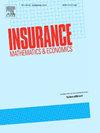Subjective survival beliefs and the life-cycle model
IF 2.2
2区 经济学
Q2 ECONOMICS
引用次数: 0
Abstract
Evidence from panel surveys of households, collected over several years and in different countries, shows that people's perception about their remaining lifetime deviates from actuarial data. This has consequences for consumption, savings and investment over an individual's financial life cycle, and in particular for retirement planning and the purchase of annuities. We use data from the U.S. Survey of Consumer Finances to estimate subjective survival probabilities at different ages. This relies on two different methods of adjusting survival probabilities from a suitable life table. We observe survival pessimism at younger ages and optimism at older ages, consistent with the literature. We optimize numerically for consumption, investment and annuitization in a life-cycle model where individuals receive stochastic labour income and invest in a risk-free asset and in stock whose returns are imperfectly correlated with wages, and where they can annuitize their wealth at retirement. We demonstrate that there is some under-saving before retirement, over-saving post-retirement, and under-annuitization when subjective survival beliefs are used, relative to objective survival expectations. These effects are fairly small, irrespective of the method employed to estimate subjective mortality. Subjective survival beliefs do not therefore fully explain household finance puzzles such as the “annuity puzzle”, i.e. observed lower-than-optimal demand for annuities. This conclusion is robust to variations in risk preferences, in the labour income profile, and in the loading factored by insurers in annuity prices.
主观生存信念与生命周期模型
几年来在不同国家收集的家庭小组调查证据表明,人们对自己剩余寿命的看法与精算数据存在偏差。这对个人财务生命周期中的消费、储蓄和投资产生了影响,特别是对退休计划和年金的购买。我们使用来自美国消费者财务调查的数据来估计不同年龄的主观生存概率。这依赖于从合适的生命表调整生存概率的两种不同方法。我们观察到年轻时的悲观情绪和老年时的乐观情绪,与文献一致。我们在一个生命周期模型中对消费、投资和年金化进行了数值优化,在这个模型中,个人获得随机劳动收入,投资于无风险资产和股票,这些资产和股票的回报与工资不完全相关,他们可以在退休时将财富年金化。我们证明,当使用主观生存信念时,相对于客观生存预期,存在一些退休前储蓄不足,退休后储蓄过剩和年金化不足。无论采用何种方法来估计主观死亡率,这些影响都相当小。因此,主观生存信念并不能完全解释家庭财务难题,如“年金难题”,即观察到的低于最优的年金需求。这一结论对于风险偏好、劳动收入状况和保险公司在年金价格中考虑的负担因素的变化都是稳健的。
本文章由计算机程序翻译,如有差异,请以英文原文为准。
求助全文
约1分钟内获得全文
求助全文
来源期刊

Insurance Mathematics & Economics
管理科学-数学跨学科应用
CiteScore
3.40
自引率
15.80%
发文量
90
审稿时长
17.3 weeks
期刊介绍:
Insurance: Mathematics and Economics publishes leading research spanning all fields of actuarial science research. It appears six times per year and is the largest journal in actuarial science research around the world.
Insurance: Mathematics and Economics is an international academic journal that aims to strengthen the communication between individuals and groups who develop and apply research results in actuarial science. The journal feels a particular obligation to facilitate closer cooperation between those who conduct research in insurance mathematics and quantitative insurance economics, and practicing actuaries who are interested in the implementation of the results. To this purpose, Insurance: Mathematics and Economics publishes high-quality articles of broad international interest, concerned with either the theory of insurance mathematics and quantitative insurance economics or the inventive application of it, including empirical or experimental results. Articles that combine several of these aspects are particularly considered.
 求助内容:
求助内容: 应助结果提醒方式:
应助结果提醒方式:


